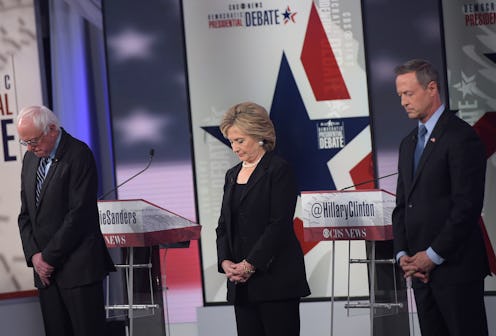Recent mass shootings, Obama's updates on the fight against ISIS, and Democrats' concern about the middle and lower class warrant a hunch that the topic of the third Democratic debate will rotate around topics of gun control, national defense and the economy. Although the DNC hasn't released an official debate topic, it's pretty safe to assume it'll be a general interest free-for-all.
The Democrats' last debate happened just about a month ago in Iowa on Nov. 14, the day after the shootings in Paris shook the world. In response to the tragedy, the Democrats spoke about U.S. involvement in the Middle East and discussed how the nation should combat ISIS. Naturally, foreign policy was the prominent topic of the night and Hillary Clinton, who has the most experience having served as Secretary of State from 2009 until 2013, dominated. This time around, the candidates will likely remain focused on foreign policy for a few reasons, but will probably also use the debate as an opportunity to push for stricter gun control laws in light of the recent San Bernardino mass shootings.
The Dems already spoke about foreign policy, so why will they bring it up again? Simply put, it's on America's mind in a huge way. Following a meeting with Defense Secretary Ash Carter, President Obama addressed the Pentagon and assured the United States that ISIS is on the decline. His most memorable line was the chilling "You are next" in a direct address to ISIS' leaders. Prior to this address, Obama made an Oval Office speech just a week prior on Dec 7. Needless to say, he is committed to keeping the nation updated on ISIS' status since Carter announced the deployment of addition Special Ops forces to northern Iraq.
The American people have another huge reason to be thinking about the nation's foreign defense policy and involvement in the Middle East. Following 9/11, American troops were stationed in the Middle East for over a decade and were withdrawn from Iraq only four years ago. In November, shortly after the attacks in Paris, Reuters conducted a poll to gauge America's feelings about returning to the region to combat ISIS.
According to the poll, the majority of Americans feared that a terrorist attack, similar to the one in Paris, could happen in the U.S. Even so, 65 percent of participants were still against sending special forces to the Middle East. To an even greater extent, 76 percent were against sending ground troops. Less than a month after the poll was taken, the U.S. did indeed send special forces to the region, but Obama has used his last two national addresses to stand behind his refusal of a "boots on the ground" strategy. The Democratic candidates will talk about the president's decision to keep combat troops out at all costs.
This Tuesday, Clinton followed in Obama's footsteps and made a campaign speech on her strategy for fighting ISIS. According to CNN's Dan Merica, the address will mark her third speech on ISIS in the past month. A Clinton aide shared the details of her upcoming speech.
[Clinton] will propose a comprehensive strategy to counter each step in the process that can lead to a terrorist attack like San Bernardino, from recruitment, to training, to planning, to execution, all while staying true to our values.
The speech's content illustrates which topics are in the forefront of the American mind at the moment: San Bernardino and defense strategy. Though these two subjects are prominent, it's important to remember that as a general rule, Republicans can seem more concerned than Democrats about bolstering national defense. In order to appeal to the Democrats that will be tuning into their party's debate, the candidates will most likely squeeze in a discussion about the economy, in addition to the commentary on defense and gun control. A Gallup survey, released this past Monday, suggests that while terrorism is the greatest concern for 16 percent of respondents, without party affiliation, only 9 percent of Democrats listed terrorism as the top issue. However, among all respondents, 21 percent believed that "some aspect of the economy" was most important.
If a discussion on the economy does indeed move to front and center stage, the debate will definitely be more balanced between Clinton and Sanders, who each have distinctive ideas on the matter. Contrary to defense policy, it doesn't give Clinton a definite advantage.
